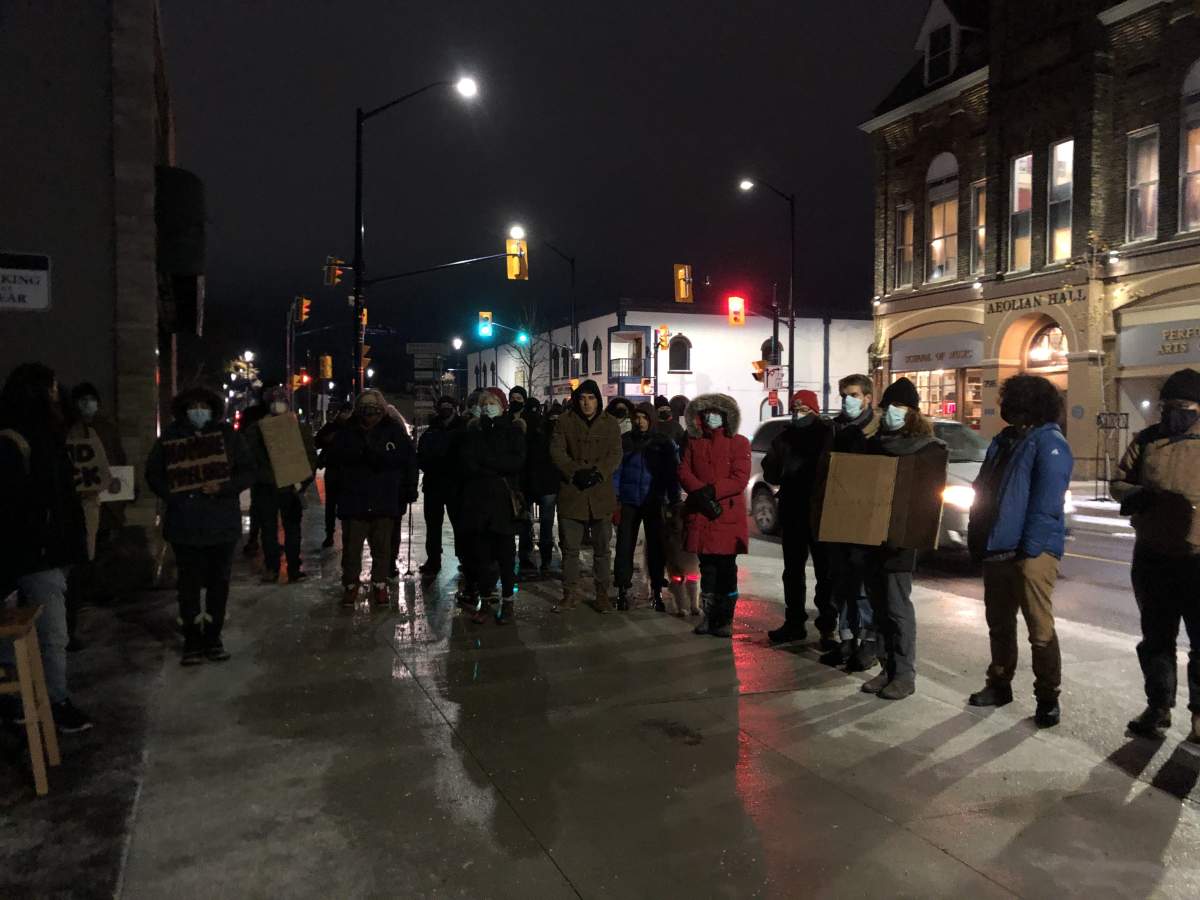Supporters in London gathered to show solidarity with the Wet’suwet’en people on Friday night, who are fighting a natural gas pipeline project in British Columbia.

The rally, titled Allies in Solidarity with the Wet’suwet’en, happened at 6 p.m. across from the Aeolian Hall where Indigenous singer-songwriter Buffy Sainte-Marie was scheduled to play later that night.
Around 40 people came out to show their support and listen to two Mohawk activists who had recently travelled out to the Gidimt’en checkpoint in northern B.C. to stand in solidarity with the Wet’suwet’en.
The two were among those arrested at the most recent blockade that was taken down by RCMP.
“I have seen river poisoned, I have seen a river contaminated beyond repair, so when I saw this pristine, untouched, alive water source I know we had to do something to protect it,” said Mohawk activist Layla Staats.
Staats said she has been working on a documentary about water and boiled water advisories on reserves, which is what prompted her to want to go out to the camp with fellow members of her community.
“This is not just about their river, this is not just this fight, this is not just them alone, and we are all standing together to say this is not right, to say there is no consent, and when we say no it needs to be heard.”
The Morice River, which runs through the territory, is still considered to be a clean water source by those in the area and is a large part of the Wet’suwet’en people’s fight against a pipeline going through the area.
Mohawk activist Skyler Williams described the feeling of being in a place where the water is so clean you can drink directly from it. “It’s something worth fighting for,” Williams said.

Get daily National news
“The lands we are on right now are borrowed. We borrow these land from future generations, so whatever we can do to stand for those lands or to stand for those waters and certainly to stand for each other.”

On Friday, Nov. 19, B.C. RCMP arrested 15 people, including two journalists, as they moved to enforce an injunction.
The RCMP was enforcing a B.C. Supreme Court-ordered injunction that stops opponents from impeding access to Coastal GasLink’s activities, permitted under Canadian law.
The day prior, RCMP said they were preparing to “rescue” more than 500 workers “trapped” by a blockade that aims to stop a pipeline’s construction on unceded First Nations land.
Several days prior, the Gidimt’en checkpoint, which shares information about the blockade, tweeted that the Wet’suwet’en Nation had successfully enforced its “ancient trespass laws” and closed the territory.
“The Morice Forest Service Road has been destroyed and access to Coastal Gaslink is no longer possible,” it said.
The members of the Wet’suwet’en First Nation and supporters have been fighting against the Coastal GasLink natural gas pipeline for several years, with RCMP responding to similar blockades being set up to block construction in January 2019 and 2020.
“The Wet’suwet’en people, under the governance of their Hereditary Chiefs, are standing in the way of the largest fracking project in Canadian history. Our medicines, our berries, our food, the animals, our water, our culture, our homes are all here since time immemorial,” Sleydo Molly Wickham said in a statement earlier this week.
Wickham has been the main spokesperson for the Gidimt’en checkpoint for several years and is also a member of the Gidimt’en Clan within the Wet’suwet’en First Nation.
Award-winning photojournalist Amber Bracken and documentary filmmaker Michael Toledano were also among those arrested, and have since been released.
The Wet’suwet’en are a northern B.C. First Nation who have never signed any treaty or given up the rights or title to their land.
In 1997, the Supreme Court of Canada ruled in the Delgamuukw-Gisday’wa court case that the Wet’suwet’en had not given up the rights or title to their land.
According to a report from the BC Treaty Commission, the ruling means that the “aboriginal title does exist in British Columbia” and that “when dealing with Crown land, the government must consult with and may have to compensate First Nations.”
While several elected chiefs on reserves have signed onto the Coastal GasLink Project, the hereditary chiefs remain against It.
The Wet’suewet’en hereditary chiefs have long maintained that the elected band chiefs do not have the jurisdiction to speak on behalf of the nation and that the hereditary chiefs, an independent governing body that represents the clans within the Wet’suwet’en Nation, do.
— with files from Global News’ Elizabeth McSheffrey and The Candian Press











Comments